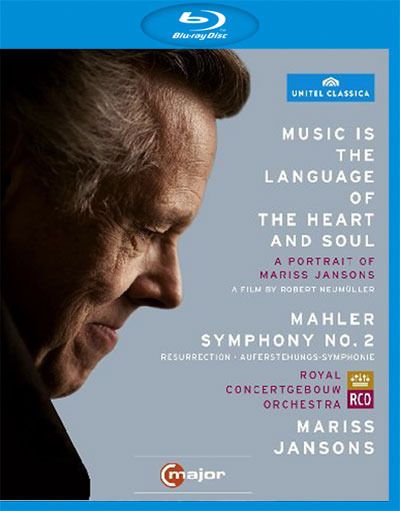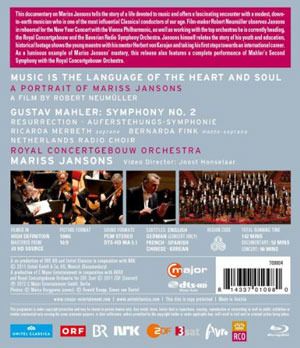14:19
Music Is The Language Of The Heart And Soul: A Portrait Of Mariss Jansons - Mahler Symphony No. 2 Ressurection / Mahler, Royal Concertgebouw Orchestra , Merbeth [Blu-ray]
Posted by Listen With Your Eyes
Music Is The Language Of The Heart And Soul: A Portrait Of Mariss Jansons - Mahler Symphony No. 2 Ressurection / Mahler, Royal Concertgebouw Orchestra , Merbeth [Blu-ray]
Conductor: Mariss Jansons | Composer(s): Gustav Mahler | Orchestra/Ensemble: Royal Concertgebouw Orchestra | Label: C Major | Blu-ray | Picture format: 16:9, HD | Sound format: PCM Stereo, PCM 5.1 | File host: Share-online.biz | 5% recovery record + 1 .rev files | Run time: 142 minutes | 41.63 GB
Language(s): German | Subtitle(s): German, English, French, Spanish, Chinese, Korean
Conductor: Mariss Jansons | Composer(s): Gustav Mahler | Orchestra/Ensemble: Royal Concertgebouw Orchestra | Label: C Major | Blu-ray | Picture format: 16:9, HD | Sound format: PCM Stereo, PCM 5.1 | File host: Share-online.biz | 5% recovery record + 1 .rev files | Run time: 142 minutes | 41.63 GB
Language(s): German | Subtitle(s): German, English, French, Spanish, Chinese, Korean

Mariss Jansons is one of the most influential conductors of our age. In 2012 the charismatic Latvian musician conducted his second New Year Concert in Vienna, an honour that very few conductors have enjoyed. For the present documentary portrait, the film maker Robert Neumüller observed Jansons at work in Amsterdam, Riga, St Petersburg, Vienna and Salzburg. The film shows Jansons working with his various orchestras, including rehearsals for the 2012 New Year Concert, and also explores his private life, resulting in a number of fascinating insights into Jansons’ artistic development and philosophy. By way of a bonus, this release features a complete performance of Mahler’s Second Symphony with the Royal Concertgebouw Orchestra under Mariss Jansons.
Watch a Trailer (sample is a lower resolution than actual DVD or Blu-ray):
Music is the Language of Heart and Soul is the only available documentary about Mariss Jansons from his early days till today. Jansons is one of the leading conductors, performing with the most important orchestras in the world. This blu-ray disc includes a performance with Mariss Jansons and Concertgebouw Orchestra of Mahler. "Mariss Jansons is one of the best orchestra builders around." The New York Times "No conductor has a more extraordinary story to tell than Mariss Jansons." The Independent
REVIEW
David A. McConnell, MusicWeb International
Mariss Jansons’ Mahler performances with the Concertgebouw Orchestra strongly remind me of the Decca cycle recorded by this orchestra with their previous director, Riccardo Chailly. The preparation is scrupulous, featuring wonderful attention to detail. Every orchestral section displays immaculate intonation and ensemble, while the solos are always played with assuming virtuosity and the highest level of musicianship. The orchestra has always had a uniquely burnished sound that seems made for Mahler’s music. When this disc arrived for review, I had just finished listening to Chailly’s boxed set of the symphonies and had purchased Chailly’s new Mahler DVDs of Symphonies Nos. 2 and 8, performed by the Gewandhaus, Leipzig. It was intriguing to compare these two Chailly performances with the one caught on Jansons’ Blu-ray disc.
Chailly’s Concertgebouw performance is arguably the worst in his cycle. From start to finish it is all beautifully played, but never catches fire. The sound lacks energy and seems overly cautious, as if both orchestra and chorus are intent on showing how beautiful they can sound. Jansons’ Concertgebouw performance is far more impressive - orchestral sound remains astoundingly beautiful, but the players seem far more engaged. There is an obvious rapport between Jansons and his musicians; witnessing that relationship - I cannot think of any other performance I have seen on DVD where the conductor smiles so much of the time - only adds to the viewer’s enjoyment.
My past experience with Jansons’ Mahler has left me ambivalent. I once owned his recording of Symphony No. 2 featuring the Oslo Philharmonic (Chandos, 1992) and have more recently heard his performance of Symphonies Nos. 1 and 6 with the Concertgebouw. His performances always display thorough preparation, attention to detail and an acute awareness of structure. What I often find lacking is that last ounce of inspiration that seems so readily apparent in Bernstein, Tennstedt and Abbado. This performance, however, immediately drew me in. With that final massive E-flat chord, I was overwhelmed, keenly aware that this was Mahler of great conviction and overwhelming technical excellence. With stunning surround sound and a picture so clear you could practically read the score over Jansons’ shoulder, I thought this was unequivocally the prime recommendation for a DVD of Mahler’s Second Symphony. Then I watched Chailly’s performance.
The Gewandhaus Orchestra plays with a powerful fervor and engagement that was sorely lacking in the earlier recording. Chailly conducts like a man possessed and the orchestra is with him every step of the way. Again, the rapport between musicians and conductor is readily apparent, and the Gewandhaus musicians have nothing to fear from comparison with their Dutch neighbors. Once again I was overwhelmed at the final E-flat chord, as Mahler’s ideas about God, faith and the afterlife were so fully conveyed. How to choose between these two awesome performances?
I wish I could write that the Mariss Jansons film tips the scales. This well made, substantial (52 minutes long) documentary follows Jansons as he visits his hometown of Riga, Latvia, prepares for a Tchaikovsky opera performance in the Netherlands, and for a New Year’s Day Concert with the Vienna Philharmonic. Towards the beginning of the film, where several people share how much they admire and love working with Jansons, I feared this might end up being a superficial publicity film. Yet once Jansons began reflecting on his health struggles, and growing up in a country controlled by the Soviet Union, we receive great insight into what has made him the musician he is today. Interestingly, as Jansons shares what he learned studying under Karajan, one cannot help but be struck by his unassuming humility, in stark contrast to his mentor. I came away with a new admiration for Jansons, the musician and the man.
Nevertheless, will I watch this film repeatedly? I doubt it unless I want to directly quote something Jansons said during the filmed interviews - the title of the film is in fact a Jansons quote. Therefore, the film does not add greatly to the value of this disc. Choosing between the Chailly and Jansons performances is really difficult; you won’t go wrong with either performance. If forced to choose just one, I would go with Jansons, because orchestra, soloists, choir, conductor, and the hall itself are filmed and recorded so magnificently. Watching, you will be renewed and uplifted, and that is surely what Mahler intended.
Works on This Recording
Symphony no 2 in C minor "Resurrection" by Gustav Mahler
Conductor: Mariss Jansons
Orchestra/Ensemble: Royal Concertgebouw Orchestra
Period: Romantic
Written: 1888/1896; Germany




0 comments:
Post a Comment